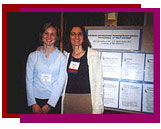











Sexual Coercion, Self-Blame, and Well-Being
Shannon Glenn and I have conducted several studies examining the impact of sexual coercion on women. We have focused on the role of self-blame on women’s decreased well-being following sexual coercion. Specifically, these studies examined whether self-blame cognitions (i.e., internal attributions) and feelings (i.e., guilt) are necessarily the same processes, or if women can have a “head” versus “heart” experience where they “know” they are not to blame, but nonetheless “feel” guilty. If these are different processes, they should differentially impact women’s well-being following sexual coercion.
In Study 1, we surveyed 119 university and college women who had been sexually coerced. Our results showed that stronger self-blame thoughts and feelings are related to women’s increased symptoms of depression, decreased self-esteem, and increased trauma symptoms. We also found that thoughts and feelings were each important in understanding women’s decreased well-being following sexual coercion. This study was published in the Canadian Journal of Human Sexuality.In a related study, we examined gender differences in the cognitive and affective responses of 112 women and 28 men who had experience sexual coercion with respect to their most serious or upsetting experience. The women were more upset than were the men at the time of the incident. Contrary to predictions, the men and women did not differ in the extent to which they attributed blame to themselves or in the strength of their internal attribtuions, guilt, or shame. Both the men and women attributed significantly more blame to the coercer than to themselves; however, the women attributed significantly more blame to the coercer than the men did. The women reported more trauma symptoms than the men did which was related to the finding that more women than men had experienced sexual coercion involving physical force. A manuscript based on these findings was recently published in the Journal of Interpersonal Violence.
In Study 2, 225 male and female college and university students who had never experienced sexual coercion read sexual coercion scenarios and imagined themselves in the place of the victim. We found that women believed that they would be more negatively impacted by sexual coercion by a dating partner than men did. We also found that the women expected to feel guiltier than the men expected to feel following sexual coercion and that they would blame the perpetrator more than the men would. The characteristics of the sexual coercion experience affected how both men and women rated the seriousness of the scenario. We are currently preparing a manuscript based on this work.
The main goal of Shannon’s dissertation was to understand the mechanisms involved in university women’s relationship and sexual satisfaction in opposite sex dating relationships following sexual coercion. Specifically, this project examined the impact of sexual coercion, self-blame, and a number of historical and situational factors on women's relationship and sexual satisfaction in dating relationships. Participants were 189 women attending university or community college who were in a relationship with a male partner of between 3 and 36 months in duration. Forty-one percent of the women reported that they had been sexually coerced. Notably, self-blame was a key risk factor in understanding women's relationship well-being over and above other risk factors. We also identified a number of important risk factors for predicting self-blame. The research identified implications for research and therapy related to sexual coercion.
The following publications are based on these studies:
Byers, E. S., & Glenn, S. (2012). Gender differences in cognitive and affective responses to sexual coercion. Journal of Interpersonal Violence, 27(5), 827-845. DOI: 10.1177/0886260511423250
Glenn, S., & Byers, E. S. (2009). The roles of situational factors, attributions, and guilt in the well-being of women who have experienced sexual coercion. Canadian Journal of Human Sexuality, 18, 201-219.





